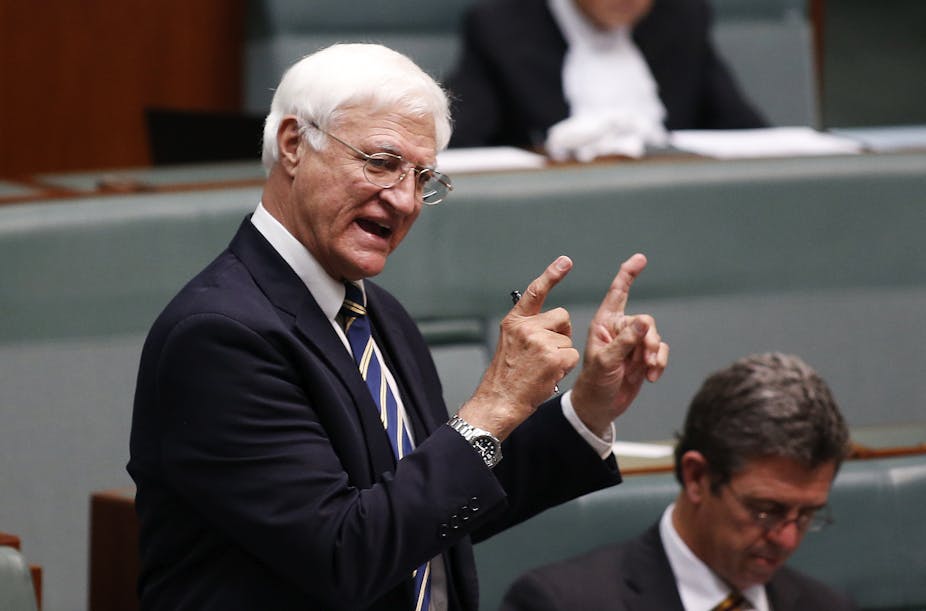The way our politicians are reacting in face of the Ebola crisis ravaging West Africa casts Australia’s character as a nation in a poor light.
Federal MP Bob Katter claims aid workers who’ve been going to help are creating a risk at home. “One person’s moral and humanitarian ambitions are being carried out at a very grave cost to Australia,” he said on Thursday.
The federal government has declined to deploy medical teams because it says it can’t arrange evacuations for anyone who might become infected.
Tony Abbott said this week: “As I understand things, the public health systems in some of the West African countries are all but overwhelmed and there’s really not much point deploying Australian personnel over and above those that are already there with the NGOs like Médecins Sans Frontières into a situation without a clear plan and that’s what we need.”
The government has allocated $18 million – first $1 million, followed by $7 million and then a further $10 million.
But much more should be done, and what is most required is help in the form of experts.
Also, there needs to be a note of realism in the assessment of the local situation. While it is vital to have adequate airport screening and protocols for volunteers coming home after working with patients in Africa, the extent of the threat domestically has to be kept in perspective.
“Fears Killer Has Arrived: Ebola Scare Hits Home” screamed a Friday tabloid headline, reporting that nurse Sue-Ellen Kovack, who has recently returned from a stint in Sierra Leone, was in the Cairns hospital being tested after having a fever. (The initial test has come back negative – there is follow up testing over the weekend.)
Medical epidemiologist Tony Stewart, senior fellow at the Burnet Institute’s Centre for International Heath, chairs the co-ordinating committee of the Global Outbreak Alert and Response Network, which provides the World Health Organisation with a technical surge capacity for crises such as this. Working out of Geneva, he is pulling together the response effort from the network’s member institutions around the world (which number some 300).
In relation to the domestic situation, Stewart says that among the public there is a big element of the fear of the unknown. He likens the worries expressed by some about the possibility of a local outbreak to the panic seen in the early days of AIDS.
While Ebola is lethal, it is “not a particularly easy disease to catch when there is quality medical care, compared to pandemic influenza or SARS”, Stewart says. Even if some arrivals from Africa did carry it, there would not be a major health problem in Australia given our facilities. (Of course the public psychology would be something else.)
Stewart (who’s briefly back in Australia) rejects both the Abbott argument that there isn’t much point deploying more Australian personnel and the government’s claim that it can’t guarantee adequate evacuation.
“What’s needed most is not money but people,” he says. “The United States is looking for international partners to staff 17 Ebola treatment units.
"There is an urgent need for the Australian government to support the global efforts through the deployment of medical and public health experts.
"We’ve done this before in other crises. This situation is dramatically worse than anything we’ve seen. We need to deal with this at its sources rather than just trying to stop it at our borders, which appears to be Australia’s current policy.”
He dismisses the evacuation argument as a way to avoid the issue. An infected person would not be flown to Australia, because of the distance, but they could be sent somewhere else. The UK, the US and some EU countries have all made arrangements, at manageable levels of risk.
“While you can’t guarantee Medevac, so far there hasn’t been a failure of the system.” Stewart says what Foreign Minister Julie Bishop should do is talk to colleagues in the UK. “Australia is in no worse a position than any other country.”
The Public Health Association is currently collecting signatures from health professors for an open letter to be sent to Abbott next week. It had 30 signatures by late Friday.
The letter says controlling the West African outbreak is an urgent global priority and asks the Prime Minister to “take action on behalf of all Australians to
provide appropriate troops and equipment,
deploy our Australian Medical Assistance Team,
assemble and support appropriately qualified health and other civilians who are ready and waiting to help,
and make a significant financial contribution.”
It notes that the government could support the preparation of volunteers through pre- deployment training and post-deployment support.
“We are all stakeholders in this epidemic,” the letter says.
This is, indeed, a challenge to which Abbott should have Team Australia rise.

